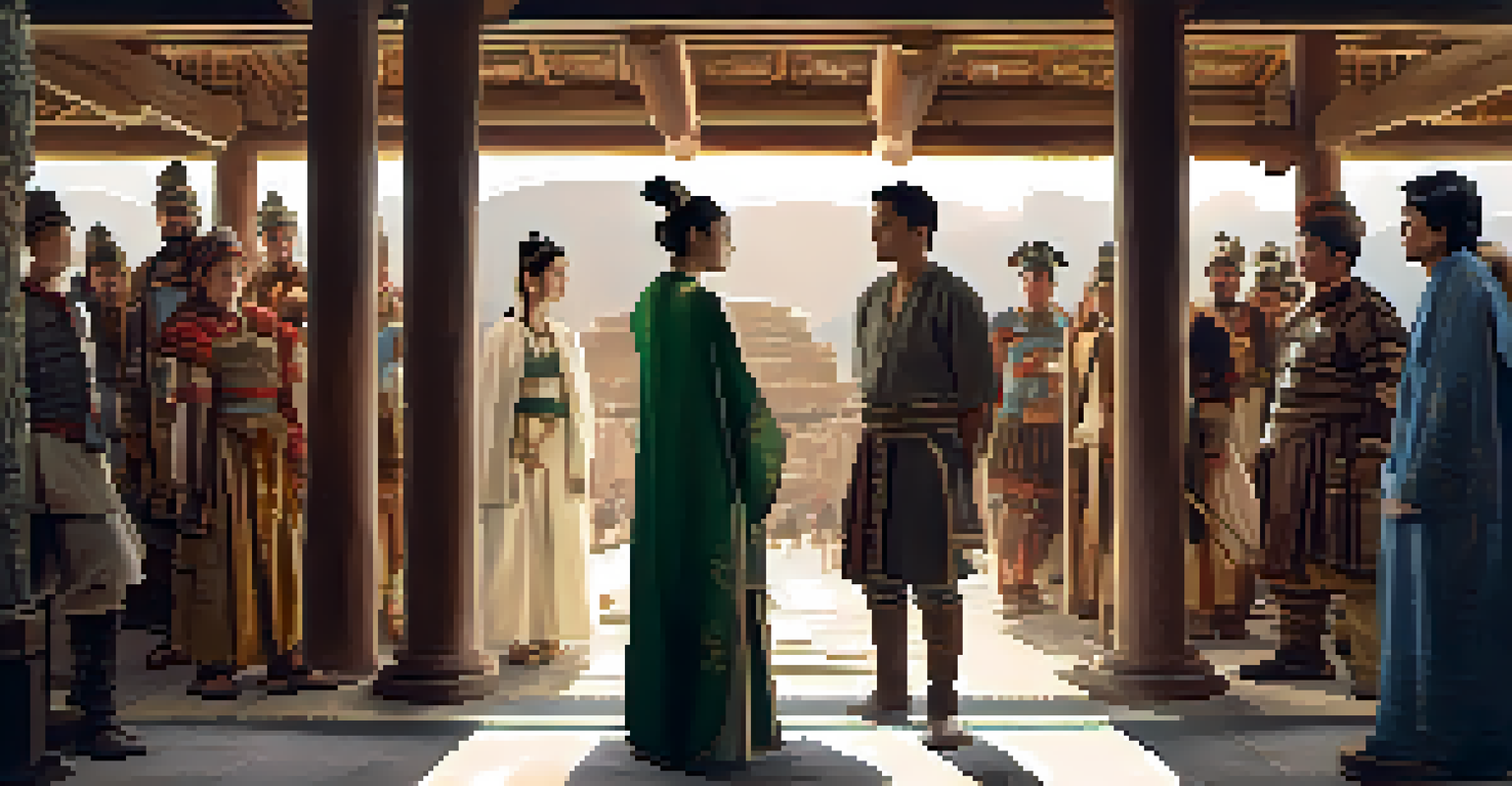Adaptations: Hollywood's Take on International Storytelling

The Allure of International Stories in Hollywood
Hollywood has a long-standing fascination with stories from around the globe. This allure often stems from the unique perspectives and cultural nuances these tales offer. By tapping into international narratives, filmmakers can present audiences with fresh ideas that break away from the norm, igniting curiosity and engagement.
Storytelling is the most powerful way to put ideas into the world today.
For instance, films like 'Parasite' and 'The Girl with the Dragon Tattoo' showcase how international stories can resonate with a wide audience. These adaptations not only bring new themes and characters to the forefront but also highlight the universality of human experiences. It's a reminder that, despite cultural differences, the core of storytelling remains the same.
Moreover, the incorporation of international stories helps to foster a greater understanding of diverse cultures. This can lead to richer narratives that celebrate rather than stereotype, providing viewers with a more authentic and immersive experience.
Cultural Nuances: The Fine Line Between Adaptation and Appropriation
While adapting international stories can be enriching, it also raises questions about cultural sensitivity and appropriation. Striking the right balance is crucial to ensure that the essence of the original narrative is preserved while making it accessible to a broader audience. Filmmakers must navigate this delicate terrain with care.

Take, for example, the adaptation of Japanese anime into live-action films. While some adaptations, like 'Ghost in the Shell,' were criticized for casting decisions, others have successfully honored the source material. This highlights the importance of involving diverse voices in the adaptation process, ensuring authenticity and respect.
Navigating Cultural Sensitivity
Successful adaptations require filmmakers to balance authenticity and accessibility, ensuring cultural respect while appealing to wider audiences.
Ultimately, successful adaptations celebrate the original culture while presenting it in a way that resonates with new audiences. This not only enriches the storytelling but also promotes a deeper appreciation for the culture it stems from.
Successful Adaptations: What Works and Why?
Certain adaptations stand out due to their successful translation of international stories into Hollywood formats. These films often retain the original's spirit while making necessary adjustments for cultural context and audience expectations. Understanding the essence of the source material is key.
Culture is the sum of all the stories we tell ourselves, and that storytelling is not just about entertainment; it’s about connection.
For example, 'The Ring,' originally a Japanese horror film, was adapted into a Hollywood version that captured the eerie atmosphere while introducing American audiences to its chilling narrative. This demonstrates that a well-executed adaptation can maintain the original's impact while appealing to different viewers.
Moreover, successful adaptations often involve collaboration between the original creators and Hollywood filmmakers. This partnership can lead to a more authentic representation of the story, making it resonate more deeply with both international and local audiences.
The Role of Technology in Modern Adaptations
Advancements in technology have significantly influenced how stories are adapted for the screen. From CGI to improved sound design, filmmakers now have tools that can bring even the most imaginative narratives to life. This technological evolution has opened up new possibilities for storytelling.
For instance, the adaptation of 'Life of Pi' showcased stunning visual effects that transported viewers into the heart of the story. The blend of live-action and digital effects created an immersive experience that honored the original novel while enhancing its themes.
Tech Advances Transform Adaptations
Modern technology enhances storytelling possibilities, allowing filmmakers to create immersive adaptations that honor original works.
Furthermore, streaming platforms have expanded the reach of international stories, allowing for diverse adaptations that might not have been possible in traditional cinema. This shift has democratized storytelling, giving voices to previously underrepresented narratives.
The Impact of Globalization on Storytelling
Globalization has played a pivotal role in shaping Hollywood's approach to storytelling. As cultures and ideas intermingle, filmmakers have the opportunity to draw inspiration from a wider array of sources. This fusion of influences can lead to innovative narratives that resonate with a global audience.
For example, movies like 'Slumdog Millionaire' blend various cultural elements to create a unique storytelling experience. By incorporating different perspectives, these films not only entertain but also educate viewers about diverse cultures and social issues.
However, this globalization also comes with its challenges, as filmmakers must navigate the complexities of cultural representation. Ensuring that stories are told authentically while appealing to a global market requires a thoughtful approach.
Challenges Faced by Filmmakers in Adaptation
Adapting international stories is not without its challenges. Filmmakers often grapple with the need to balance fidelity to the source material with the expectations of a Hollywood audience. This can lead to tough decisions about what to keep and what to alter.
For instance, adapting a culturally rich narrative can sometimes result in oversimplification or misrepresentation. Filmmakers must be vigilant in their efforts to honor the original story while making it relatable to new viewers. This requires a deep understanding of the cultural context.
Hollywood's Global Storytelling Trend
Filmmakers are increasingly drawn to international narratives, enriching their stories with diverse cultural perspectives.
Additionally, resistance from fans of the original work can pose a challenge. Filmmakers must find ways to engage with these passionate audiences while staying true to their vision, often walking a tightrope between artistic integrity and commercial viability.
Looking Ahead: The Future of Adaptations in Hollywood
As we look to the future, the landscape of adaptations in Hollywood is likely to continue evolving. With increasing demand for diverse stories, filmmakers are more motivated than ever to explore international narratives. This shift can lead to richer, more varied content that reflects a globalized world.
Moreover, the rise of digital platforms allows for more niche stories to find their audience. This means that adaptations of international tales, which may not have received attention in traditional cinema, can now flourish and reach viewers eager for diverse storytelling.

In this ever-changing landscape, filmmakers have the opportunity to redefine what it means to adapt a story. By prioritizing authenticity and collaboration, Hollywood can continue to bridge cultural gaps, offering audiences a more expansive view of the world through film.